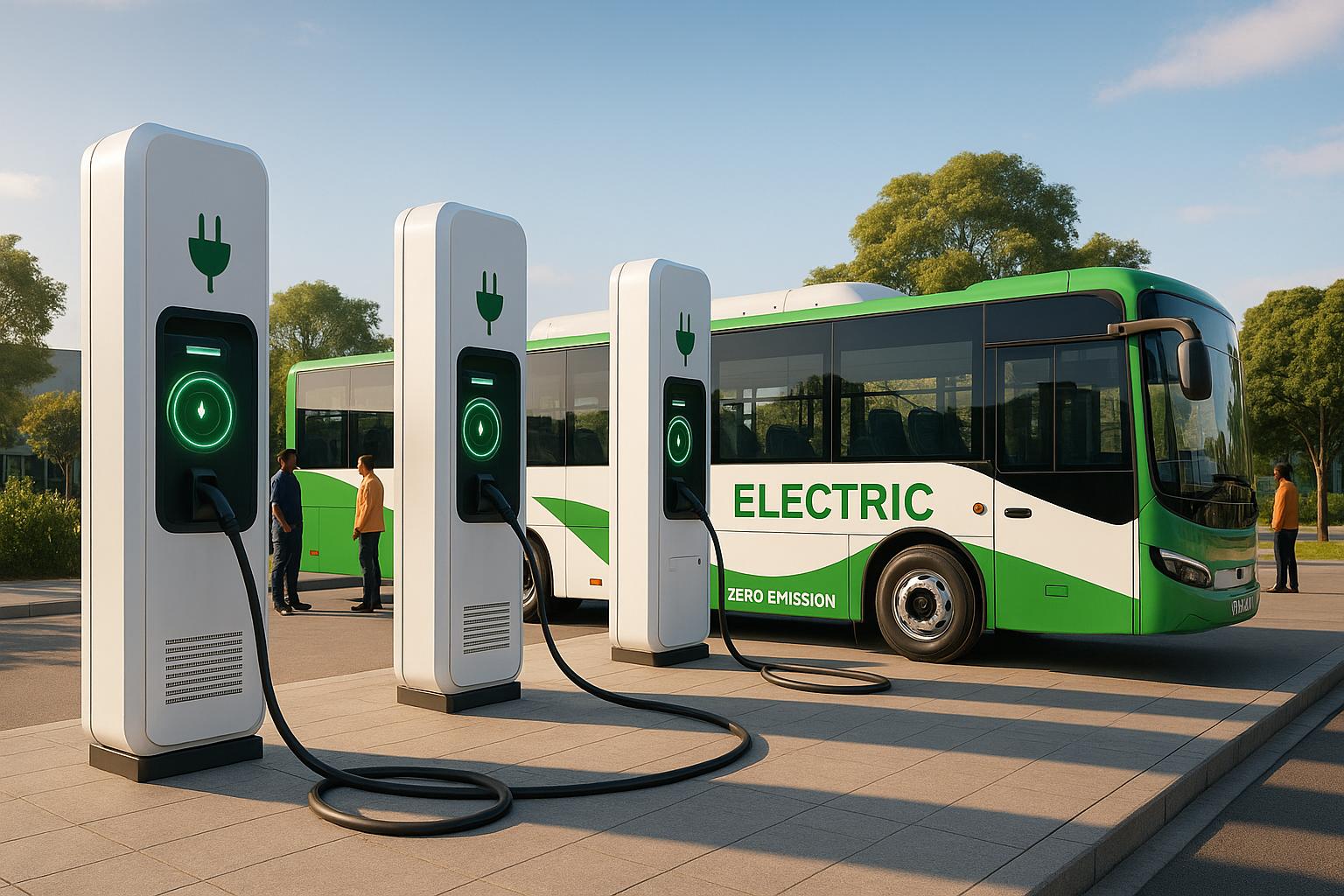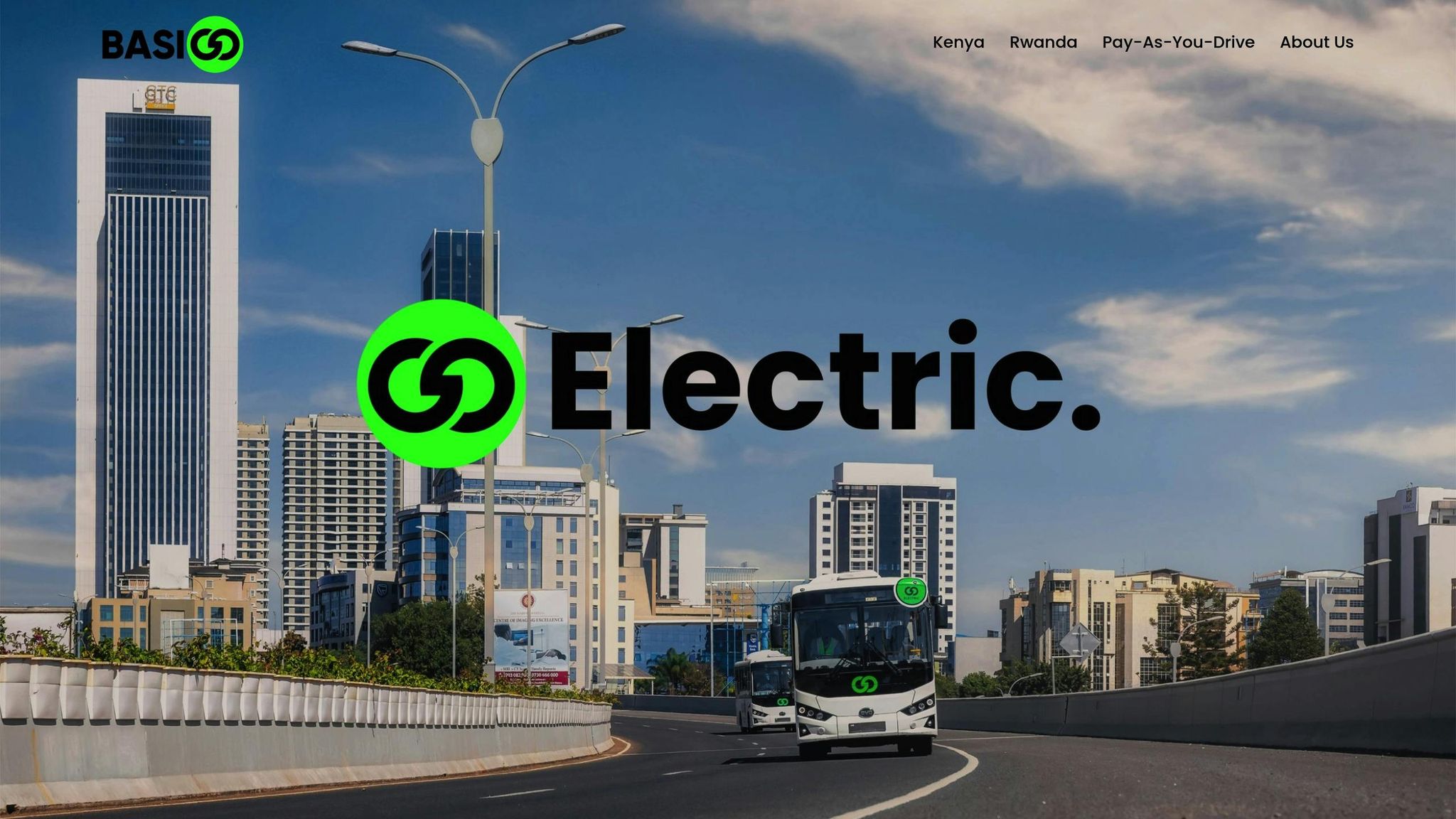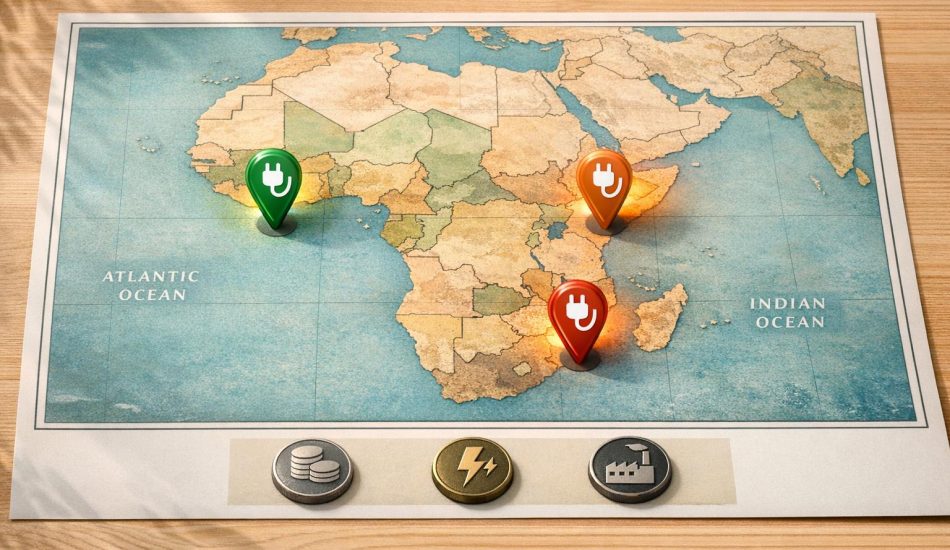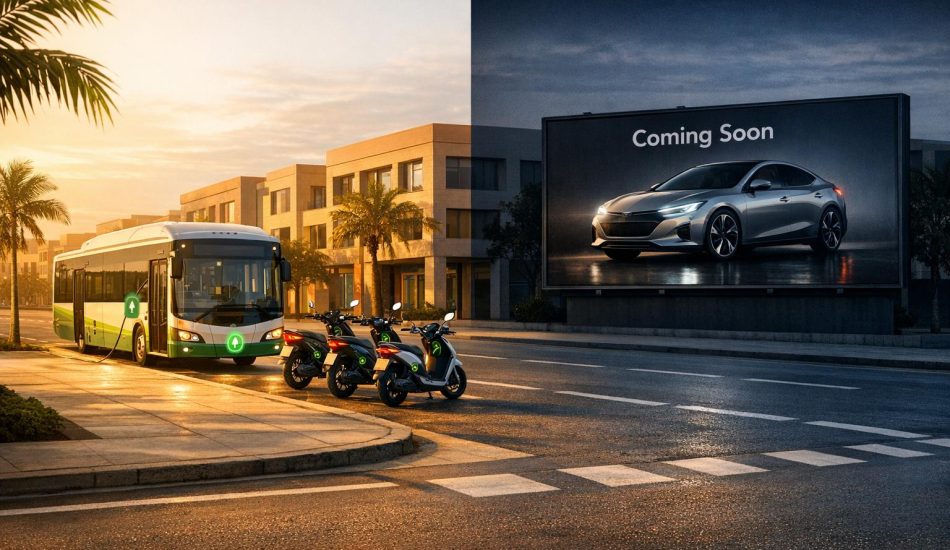
BasiGo is transforming Nairobi’s public transport by introducing 16 electric bus charging stations across the city. This initiative supports the growing adoption of electric buses, which are quieter, cleaner, and cheaper to operate compared to diesel buses. With over 84 electric buses already in operation, BasiGo aims to address air pollution, reduce CO₂ emissions, and improve commuting experiences for millions of Nairobi residents.
Key Highlights:
- Charging Stations: 16 new DC fast chargers will be installed along key routes, allowing buses to recharge in just 2 hours.
- Environmental Impact: Each electric bus cuts CO₂ emissions by 181 metric tons annually, contributing to cleaner air in Nairobi.
- Cost Savings: Electric buses reduce operating expenses by up to 50%, benefiting operators and keeping fares stable.
- Passenger Benefits: Modern buses offer amenities like Wi-Fi, USB ports, and quieter rides, enhancing commuter satisfaction.
- Renewable Energy: Kenya’s 90% renewable energy grid powers the charging network, reducing reliance on imported diesel.
BasiGo’s efforts are not only improving Nairobi’s transport system but also positioning Kenya as a leader in electric mobility in Africa.
BasiGo‘s 16 Electric Bus Charger Plan

Where the Chargers Will Be Located
BasiGo is rolling out Kenya’s first DC Fast Charge network for electric buses, focusing on key routes in Nairobi. Currently, the company operates three charging sites in Embakasi, Kikuyu, and Buru Buru, with a combined capacity to serve more than 20 buses.
The Buru Buru station, situated on Rabai Road, exemplifies this initiative. It serves as the main charging hub for electric buses operated by OMA Services and Embassava SACCO.
"Convenient and reliable charging infrastructure is the most critical challenge for electrifying public transport in Kenya. The Buru Buru station is located directly along our customer’s operating routes, making charging convenient and easy for their daily bus operations. Stations like this represent the future of how public transport will be powered in Kenya, and it is made possible through our close working partnership with Kenya Power and Lighting Company (KPLC)" – Jit Bhattacharya, BasiGo CEO
BasiGo’s future plans include deploying additional charging stations throughout Nairobi and eventually expanding across Kenya. The 16 new chargers will follow a route-based placement strategy to maximize accessibility for bus operators while reducing downtime. These stations will also feature cutting-edge technology, as detailed below.
Charger Capacity and Technical Details
BasiGo’s charging stations are equipped with CCS-2 chargers that can fully recharge an electric bus in just two hours. These chargers are also compatible with passenger cars and trucks. At the Buru Buru location, the system currently supports simultaneous charging for six buses, with plans to increase capacity to 25 buses by the end of the year. All stations are connected to Kenya’s electrical grid, which is powered by 90% renewable energy. BasiGo guarantees a 90% monthly uptime for buses, ensuring reliable operations.
"Every Electric Bus we deploy and charge replaces the consumption of 20,000 liters per year of imported diesel, with the consumption of 50 MWh of clean, renewable electricity produced here in Kenya. With the new E-mobility tariff, we are able to invest in infrastructure like this charging station and enable the rapid growth of the electric vehicle industry in Kenya." – Jit Bhattacharya, BasiGo CEO
The new e-mobility tariff in Kenya offers favorable electricity rates for electric vehicle charging, making operations more cost-effective for bus operators. This strong technical foundation supports BasiGo’s rapid expansion plans.
Installation Schedule and Launch Dates
BasiGo has set ambitious goals to meet the rising demand for electric buses. Over the next three years, the company plans to support the introduction of 1,000 electric buses for Nairobi’s operators. With over 500 orders already placed by Nairobi-based operators and an additional 100 reservations from Kigali, Rwanda, the need for a robust charging network is clear.
The rollout schedule prioritizes establishing a comprehensive network across Nairobi before expanding to other parts of Kenya.
Effects on Nairobi’s Transport and Air Quality
Growing Electric Bus Numbers
BasiGo is tackling one of the biggest hurdles to electric bus adoption in Nairobi – range anxiety and limited charging infrastructure – by expanding its charging network. The results are already impressive: as of May 2025, 84 electric buses in their fleet have covered 4.71 million kilometers and transported nearly 7.87 million passengers.
This growing network is encouraging broader adoption across the region. For example, OMA SACCO has transitioned to a fully electric bus fleet serving the Central Business District, while Super Metro Sacco has added six electric buses to its 440-bus fleet. These moves show that even major operators are beginning to embrace electric mobility. With these advancements, BasiGo’s goal of supporting 1,000 electric buses within three years seems increasingly achievable.
"We aren’t going to see fossil fuel buses disappear overnight… But there is growing recognition that the future lies in electric transport." – Moses Nderitu, BasiGo’s managing director
These developments are paving the way for better air quality and healthier urban living.
Cleaner Air and Health Benefits
The rise in electric buses is making a noticeable difference in urban air quality. Each electric bus reduces CO₂ emissions by 181 metric tons annually compared to a diesel bus. To date, BasiGo’s fleet has saved 947,994 liters of diesel fuel and prevented 2,108 tons of CO₂ emissions.
Nairobi, which struggles with severe air pollution – reportedly at 70% according to the United Nations Environment Program – stands to benefit significantly. Air pollution claims nearly 19,000 lives annually in Kenya, highlighting the urgent need for cleaner transport solutions. Current estimates show that Kenya’s 15,000+ electric vehicles have already cut particulate matter emissions by 8% in key urban areas. Looking ahead, the Ministry of Health projects that by 2030, the transition to electric buses could reduce respiratory illnesses by 12% and prevent 3,700 premature deaths.
Electric buses are also quieter than diesel models, reducing noise pollution and contributing to a more peaceful urban environment, which enhances the quality of life for residents.
Cost Savings for Bus Operators
The financial advantages of electric buses are just as compelling as the environmental benefits. Reliable charging infrastructure significantly lowers operating costs. Matatu operators report saving up to 70% on operational expenses compared to diesel buses. These savings come from reduced energy costs and minimal maintenance needs.
With Kenya’s renewable energy grid supporting the transition, electricity costs remain affordable. BasiGo’s pay-as-you-drive leasing model further lowers financial barriers, allowing operators to start with a small deposit and pay competitive per-kilometer rates. This setup helps operators avoid the unpredictability of diesel prices and the steep upfront costs associated with traditional bus purchases.
"Electric buses have been a game changer for us. To start with, our customers love them and that is a plus for business. The cost of operations is also comparatively lower to fossil fuel buses." – Nelson Mwangi, Chairman of Super Metro
Electric buses also require less maintenance than diesel models, cutting downtime and repair expenses. This reliability allows operators to keep their buses on the road longer, boosting revenue while supporting a more sustainable and efficient transport system.
How Chargers Help Passengers, Operators, and Nairobi
Better Bus Rides for Passengers
Nairobi’s expanded charging network is transforming the daily commute for around 2 million public transport users. Thanks to BasiGo’s reliable charging infrastructure, electric buses now deliver a quieter, more comfortable ride. These buses come equipped with modern amenities like USB ports, Wi-Fi, TV screens, and security cameras, making the journey not just efficient but enjoyable.
Passengers are clearly embracing the shift to electric buses. Instead of buses waiting for passengers, it’s now the other way around. Mutoro Sifuna, Marketing and Communication Manager at BasiGo, shared:
"We have had passengers calling our drivers to find out when the electric buses are coming so that they can schedule their travel."
CEO Jit Bhattacharya echoed this sentiment:
"I think passengers, once they go and experience (our buses), they’re not ready to go back."
These improved passenger experiences, paired with significant cost savings for operators, show why electric buses are becoming a preferred choice.
Making Electric Buses Affordable for Operators
At first glance, the price difference between electric and diesel buses seems steep. A 25-seater electric bus costs about $171,053, compared to $36,184 for a diesel bus – nearly five times more. But the math changes when you consider the long-term savings. Electric buses can slash operating costs by more than 50% compared to diesel alternatives.
The expanded charging network is also helping operators stabilize their finances. Hon. Jessee Wanyeki, Chairman at CBS, explained:
"Maintaining consistent fare prices will now be achievable for transport operators, empowering passengers to anticipate fares reliably, unlike previous scenarios influenced by fluctuations in fuel prices."
Drivers of electric buses are also seeing the benefits, earning 30–50% more than their diesel-driving counterparts. With BasiGo’s 16 planned chargers ensuring smooth operations, operators can maximize revenue while keeping costs predictable.
Nairobi’s Green Development Goals
Nairobi is positioning itself as a leader in green urban development, with the charging infrastructure playing a pivotal role in this transformation. Kenya aims to assemble 1,000 electric buses for public transport by 2027, a move that aligns with its broader goal of fostering sustainable economic opportunities. In July 2024, Afrigreen Automobile, a Kenyan company, partnered with Chinese manufacturer Chery in a $20 million deal to set up an assembly plant capable of producing 5,000 to 6,000 EVs annually.
With 90% of Kenya’s electricity coming from renewable sources, the charging network not only reduces reliance on imported oil but also offers a more stable and predictable energy supply. This shift is creating new jobs in renewable energy and automotive industries, aligning economic growth with environmental priorities.
George Muriithi Githinji, Chairman and Cofounder of Oma Services Limited, highlighted the broader impact:
"I was first struck by how quiet and smokeless the electric buses are. It’s a win for the environment, the investor, and passengers as far as I can tell."
How EV24.africa Supports Electric Vehicle Growth

EV24.africa’s Electric Vehicle Marketplace
EV24.africa is changing the way businesses and individuals in Nairobi access electric vehicles (EVs) by building a marketplace that spans all 54 African countries. Featuring top global brands, the platform offers a wide variety of models, catering to different budgets – from cost-effective options to high-end vehicles – all with upfront and transparent pricing.
With a team of over 200 professionals spread across five African countries, EV24.africa provides personalized assistance throughout the purchasing process. This localized approach is especially valuable in Nairobi, where the EV market is growing alongside infrastructure developments like BasiGo’s charging stations.
"At EV24.africa, we simplify the process of importing and buying electric vehicles in Africa. Our expertise ensures a seamless, transparent, and stress-free experience, so you can focus on driving the future of mobility."
Connecting Vehicles with Charging Networks
EV24.africa ensures that the vehicles offered are compatible with Nairobi’s expanding EV infrastructure. As BasiGo’s 16 charging stations prepare to revolutionize the city’s electric bus network, EV24.africa helps buyers choose vehicles that align with the available charging facilities. The platform provides detailed specifications for each vehicle, enabling customers to understand charging requirements and capabilities before making a purchase.
With Kenya aiming to establish 10,000 EV charging stations by 2030, EV24.africa’s marketplace becomes an essential tool for matching vehicles to the growing infrastructure. This is particularly crucial as electric motorcycles make up nearly 90% of all registered EVs in the country.
Making Electric Vehicles More Affordable
EV24.africa tackles affordability and accessibility challenges head-on, making EV adoption easier. The platform offers flexible financing options and handles the entire import process, including customs clearance, local registration, and compliance. Additionally, customers can choose from various shipping options to meet their specific needs.
"EV24.africa is dedicated to facilitating this transition by offering a seamless platform for Kenyan customers to import and purchase top-tier electric cars."
sbb-itb-99e19e3
Conclusion: Electric Buses Transform Nairobi Transport
Main Benefits of BasiGo’s Charger Network
BasiGo’s deployment of 16 electric bus chargers marks a turning point for Nairobi’s public transport. Partnering with Kenya Power, the company has strategically placed these charging stations along key routes, ensuring buses can recharge reliably during their daily schedules. This network directly tackles one of the biggest hurdles to adopting electric buses: access to dependable charging infrastructure.
The environmental impact is already making waves. Since its launch, BasiGo has helped avoid over 166,000 liters of diesel consumption and reduced carbon emissions by 398.4 tonnes. Their buses have collectively covered more than 870,000 kilometers and served over 1 million passengers. Each electric bus contributes to cutting more than 50 tonnes of CO₂ annually, a vital step in combating the 20% of transport-related air pollution caused by matatus in Nairobi. These achievements not only benefit the environment but also highlight the potential for long-term economic and operational improvements.
On the economic side, the advantages are clear. Electric buses can reduce operating costs by up to 50% compared to diesel buses. Additionally, BasiGo’s financing model has made these buses more accessible to operators who previously couldn’t afford the steep upfront costs.
Electric Bus Growth Across Africa
Nairobi’s progress in tackling transportation and pollution challenges offers a roadmap for other African cities. The city’s adoption of electric buses serves as a model for addressing urban mobility issues across the continent. In fact, BasiGo’s customer order book accounts for 3% of all electric buses sold globally outside of China, underscoring the growing demand for clean public transport solutions in Africa.
BasiGo’s success doesn’t stop at Nairobi. Their expansion into Rwanda demonstrates how this charging infrastructure model can be adapted to different markets. With Nairobi expected to grow into a megacity of over 14 million people by 2050, the lessons learned here will be invaluable for other rapidly expanding urban centers across Africa.
"The shift to clean, electric buses signifies more than just environmental impact; it is also a chance for Kenya to establish itself as a manufacturing hub for modern EVs and their components." – Jit Bhattacharya, BasiGo Co-founder
Looking ahead, BasiGo’s goal of having 1,000 buses on the road by the end of 2025 highlights the importance of strategic partnerships, such as those with national power companies, in accelerating the adoption of electric vehicles. Their approach offers a clear path for other cities across Africa to reduce emissions, improve air quality, and build more sustainable urban transport systems.
Basi-go launches the first charging station in Buruburu for electric buses
FAQs
What impact will BasiGo’s new electric bus charging stations have on Nairobi’s public transportation system?
BasiGo’s new electric bus charging stations are set to reshape Nairobi’s public transportation landscape. These chargers, capable of fully recharging buses in roughly two hours, will minimize downtime and allow electric buses to run more efficiently. The result? More dependable schedules, increased service frequency, and shorter wait times for commuters.
For fleet operators, this charging infrastructure brings the added advantage of lower operating costs by reducing dependence on traditional fuels. On a broader scale, these stations will play a part in improving air quality by cutting carbon emissions, aligning with Nairobi’s push for cleaner, more sustainable urban transit. This initiative promises to elevate the reliability, efficiency, and environmental footprint of the city’s public transportation system.
What are the environmental and economic advantages of adopting electric buses for Nairobi’s public transit system?
Switching to electric buses in Nairobi brings a host of important benefits for the environment and the community. For starters, these buses help cut down greenhouse gas emissions and improve air quality. That means cleaner air to breathe and a step forward in addressing climate change – making urban life healthier for everyone.
On the economic front, electric buses are cheaper to run. They save money on fuel and maintenance, which can be a big deal for transit operators. Plus, they create jobs and encourage urban development that’s built to last. The result? A smarter, more affordable public transit system that works better for both commuters and operators.
How will BasiGo ensure their electric bus charging stations in Nairobi are reliable and easy to access for operators?
BasiGo’s Electric Bus Charging Network in Nairobi
BasiGo is taking a big step toward revolutionizing Nairobi’s public transport by rolling out Kenya’s first DC Fast Charge network for electric buses. These charging stations will be strategically placed at key depots along major bus routes, making it easy for operators to recharge their buses during their daily schedules.
To ensure the system runs smoothly, BasiGo is partnering with Kenya Power to build a reliable and efficient charging infrastructure. This collaboration aims to provide consistent support for electric bus operators, simplifying their operations and paving the way for Nairobi to embrace cleaner, greener public transportation.




